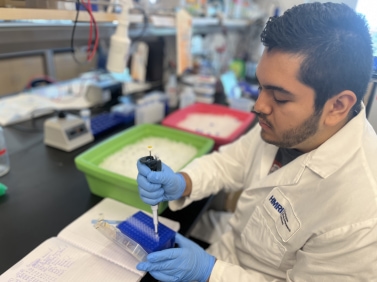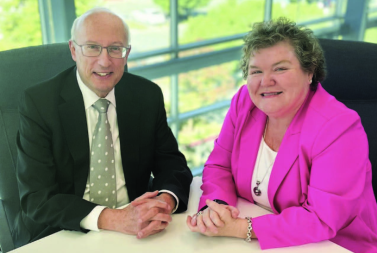Leave a Legacy, Impact the Future of Human Health
By including HMRI in your will, trust, or other plan, you will leave an enduring impact on biomedical research in Pasadena. You will join many other supporters as members of the HMRI Legacy Society. Through their foresight and generosity, Legacy Society members play a pivotal role in ensuring groundbreaking research continues for generations to come. Members are celebrated and recognized at HMRI events and programs throughout the year.
There are many ways you can leave a legacy gift to help you achieve your goals, including life income and tax-efficient estate planning. Below you will find more information on easy ways to create a legacy of support with HMRI.
If you already have left a gift to HMRI, please let us know using the button below so we can thank you.
Our team is here to help you with personalized assistance and guidance.
We are extremely thankful for your gifts, large and small. Your legacy gift to HMRI will propel biomedical research forward and ensure a brighter, healthier, and more hopeful future. If you have already included a gift, please let us know so we can thank you. Just complete this simple form and we will be in touch.
Legacy Society Stories:
HMRI President and CEO Leads by Example
Dr. Julia Bradsher’s Values Align to her Legacy Gift for HMRI
Many people have left a gift in their will or trust to organizations, like HMRI, that they care deeply about. Through these gifts, they continue their legacy of support, ensuring the mission of these organizations for years to come. President and CEO, Julia Bradsher, recently updated her estate plan, and included a gift to HMRI. Her passion for the organization will now continue long after she is gone. Julia sat down with respected Pasadena attorney Karl Swaidan to discuss her gift and planned giving.
Attorney Karl Swaidan, partner of Hahn and Hahn and HMRI president and CEO Julia Bradsher meet to discuss the impact of legacy giving.
Common Ways to Leave a Legacy
Gifts in Wills or Trusts
The most common way to make a gift to HMRI in your estate plan is by including language in your will or trust. Your gift may be a specific dollar amount, a percentage of your estate or the remainder after all other provisions are specified. Click here for suggested language. (Open new page, can just be a pdf, copy at the bottom of this page.)
Beneficiary Designation
Another common and easy way to include a gift to HMRI in your estate plan is to use a beneficiary designation. You can name HMRI to receive part of all or all of various financial accounts. Assets that can have a beneficiary designation named are, IRAs, other retirement plans, life insurance policies, Donor Advised Funds, Commercial annuities, bank accounts, brokerage accounts, and Certificates of Deposits. Besides being easy to set up, these assets also pass outside of probate, and can offer tax advantages.
Donor Advised Funds
Did you know that you can name a successor to your DAF? You can either name an individual to carry on recommending gifts, or you can name an organization like HMRI to receive any remaining funds. If you don’t name anyone, the institute that holds the DAF will be able to distribute it as they see fit. Simply reach out to your institution to find out how to name a successor.
Real Estate
Did you know there are many ways to use real estate to support HMRI now or in the future? You can give property outright, donate your home but keep living in it for as long as you want, or use real estate to fund a gift plan like a CGA, CRT, or CLT. Contact us to learn more and start the conversation.
Charitable Gift Annuity (CGA)
Charitable Gift Annuities are easy to set up and provide you fixed payments for life. Simply make a gift of cash or securities to HMRI, and then you will receive monthly payments at a set rate for the remainder of your life. HMRI will then receive the remaining funds.
Charitable Remainder Trust (CRT)
A Charitable Remainder Trust provides you or your loved ones with steady income for life or a set number of years and then the remaining assets support HMRI. CRTs can help reduce taxes, diversify assets, and create a lasting legacy.
Charitable Lead Trust (CLT)
A Charitable Lead Trust allows you to support HMRI now while ultimately passing assets to your heirs with potential tax advantages. The trust makes annual gifts to HRMI for a set number of years, and then the remaining assets transfer to your loved ones. It’s a powerful way to create meaningful impact today while ensuring your family is taken care of in the future.
Please contact us for more information about these gifts and illustrations on how they would work for you. We are always happy to answer any questions you may have.
Important Information:
Legal Name: Huntington Medical Research Institutes
Tax ID/EIN: 95-1757119
Legal Address: 686 South Fair Oaks Ave, Pasadena, CA 91105
Karl Swaidan’s Five Essential Steps to Legacy Gift Planning
One of the simplest ways to make a long-lasting impact on HMRI’s biomedical research is through a legacy gift. With a gift in your will, trust, or other plan, you can give a percentage of your estate or a certain amount of cash, securities, or property. After your lifetime, HMRI will continue the vital work that advances health outcomes.
Download our guide, “Five Essential Steps to Legacy Gift Planning.” It simplifies the complex world of estate planning and provides five actions anyone can take to get started and achieve their personal, financial, and philanthropic goals.


